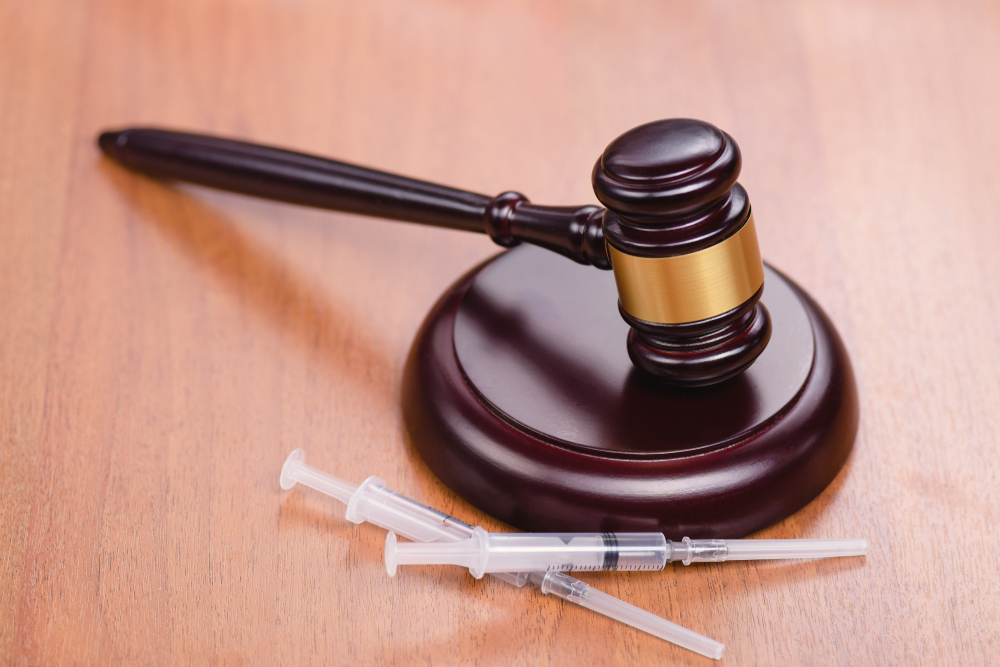Agriculture is by far the largest private industry in the commonwealth of Virginia, producing about $70 billion in annual earnings. The commonwealth’s history with farming goes back to the very founding of the U.S., and the centrality of agriculture in Virginia is a big reason why many people here are concerned about their exposure to a potentially toxic chemical, “Roundup” weedkiller.
With every job in farming and forestry supporting about 1.7 jobs in other parts of the economy, this concern spreads across many other sectors, as well. In Virginia and across the country, class-action lawsuits have been filed against Roundup and the companies that make it, with three verdicts already going in favor of people who say they got cancer from using Roundup.
Bayer, the German pharma giant that produces Roundup and owns Monsanto, the company that invented it, has proposed $12 billion in settlement money for current and future cases.
So, what should Virginia residents know about Roundup, the alleged negative health effects, and what legal rights they may have to seek compensation if they used the weedkiller and later got sick?
What Does Roundup Do?
Today, the weedkiller Roundup is the best-selling herbicide in history. But its active ingredient, glyphosate, did not start out as a weedkiller. In fact, for decades before it was patented by Monsanto for those purposes, it was used in the commercial plumbing industry to knock scale and calcium deposits off boilers and other large equipment.
But in the 1970s, a Monsanto scientist discovered that glyphosate interrupted the normal function of plants, killing basically every plant it came into contact with. As a result, the company patented glyphosate as an herbicide and began selling it under the brand name Roundup in 1974.
Roundup is an incredibly effective weedkiller, and it has become the de-facto herbicide in agriculture, landscaping, groundskeeping, and residential weed control. The ubiquity of Roundup means that billions of pounds of the herbicide have been used in the U.S. alone since it was introduced. Taking all uses into account, one study estimated that about 3.5 billion pounds have been used in the U.S. overall.
Most of that use comes from agriculture, and there are many crops that are grown from seeds made specifically to withstand Roundup —it is a non-selective herbicide, meaning it kills all plants. Roundup Ready seed began to be introduced in the 1990s, and since then, at least 26 million pounds of it have been applied to Virginia farm fields, according to U.S. Geological Survey estimates.
Glyphosate Usage in Virginia
- Since 1992, more than 26 million pounds of glyphosate have been applied to Virginia farm fields. Iowa and Illinois rank first and second thanks to their corn and soybean production.
- In 2017, the most recent year with available data, Virginia ranked 28th for glyphosate use with about 1.7 million pounds applied.
- Glyphosate is the most common herbicide or pesticide used in Virginia farming —it is used at three times the rate of its closest competitor.
- Soybeans accounted for about 49% of glyphosate used in Virginia in 2017, followed by corn (40%) and cotton (7%).
- Virginia ranks No. 20 nationwide for soybean production, with about 23 million bushels produced in 2020, and 26th for soybeans, with about 54 million bushels.
Is Roundup Dangerous?
Of the nearly 125,000 class-action lawsuits and multijurisdictional litigation that have been filed in connection with Roundup, most plaintiffs claim they were diagnosed with non-Hodgkin lymphoma, a form of cancer, after using Roundup.
All three trials that have proceeded to jury verdicts so far involve people with that cancer, and the proposed Bayer settlement money is designed to compensate people who say they got non-Hodgkin lymphoma (NHL) because they used Roundup.
Roundup and Non-Hodgkin Lymphoma (NHL)
NHL accounts for about 4% of all U.S. cancer cases in a typical year, and the American Cancer Society projects that about 21,000 people will die from non-Hodgkin lymphoma this year. More than 82,000 are expected to be newly diagnosed with it.
Virginia residents who used Roundup and are concerned about their health should be aware of physical signs of to look out for. The most common include:
- Chest pain
- Cough
- Chills
- Easy bruising
- Fatigue
- Fever
- Frequent, severe infections
- Night sweats
- Shortness of breath
- Swollen abdomen
- Swollen lymph nodes
- Weight loss
Early detection is important in NHL, as in other types of cancer. If it’s caught early, about 73% of people live at least five years. If it’s not detected until it has spread, that rate falls to 57%.
If you show any of the above symptoms and believe that you may have developed NHL as a result of exposure to Roundup, you should immediately seek medical treatment.
If Roundup causes cancer, why is it still on the market? Bayer, Monsanto, and even the U.S. Environmental Protection Agency (EPA) all maintain that the product is non-carcinogenic, meaning it does not cause cancer.
However, this is far from a consensus position, and many voices have joined the chorus against Roundup and glyphosate in recent years.
This includes:
- New York: The Empire State is poised to become the first to ban the use of glyphosate on state-owned grounds after a bill was signed in 2020. That law is set to go into effect on Dec. 31, 2021 barring legal challenges.
- California: That state’s environmental agency formally lists glyphosate as a probable carcinogen. Additionally, glyphosate is banned on University of California campuses and in dozens of communities across the state.
- World Health Organization: The International Agency for Cancer Risk, a WHO-affiliated cancer agency, in 2015 began listing glyphosate as a probable carcinogen.
- University of Washington: A group of researchers found that exposure to Roundup increased the risk of developing cancer by as much as 41%.
- International: Luxembourg, Mexico, Thailand, and Vietnam all have banned glyphosate, and German lawmakers are considering requiring farmers to phase out use of it.
- EPA: Between 1985 and 1991, the EPA itself listed glyphosate as a possible carcinogen before reversing course.
What Is the Current Status of Roundup Litigation?
So far, three cases have proceeded to trial in which plaintiffs have made allegations that not only does Roundup cause cancer but that Monsanto, the company that invented it, knew the product was dangerous but concealed the risks from the public.
Combined, those verdicts have included more than $2 billion in punitive and compensatory damages, though all three have been reduced on appeal. What has not changed upon appeal, however, are jury members’ primary findings: Roundup causes cancer, and Monsanto (and by extension, Bayer) knew about it.
More than 100,000 other cases are making similar allegations, and after suffering three consecutive legal defeats, in the summer of 2020, Bayer made a settlement offer. The company proposed to end the majority of pending cases in exchange for a $10 billion settlement.
Bayer later proposed setting aside $2 billion to compensate victims in future cases. Negotiations continue over both settlement offers, and the company continues to appeal the verdicts in court.
Labelling Settlement
A separate class-action case related to Roundup has already ended in an approved settlement in most states, including Virginia. In that case, plaintiffs alleged that wording on the product’s label led them to purchase the weedkiller when they otherwise would not have. The language in question referred to claims that Roundup could not possibly be harmful to humans or pets because it targets an enzymatic process that does not take place in mammals. Virginia residents may be eligible for up to $90 in compensation if they bought Roundup for this reason.
How Much Can I Get From a Roundup Lawsuit in Virginia?
While jury verdicts against Roundup have ended up in some eye-popping award amounts, none of the plaintiffs have yet to see a dime of the money, and with negotiations still ongoing over settlement offers, it is difficult to predict with certainty how much you could make from a Roundup lawsuit in Virginia.
However, we do have some early indications of potential characteristics the company considers worthy of higher compensation. If its $10 billion settlement were approved, it is estimated that the average payout would be about $165,000, but victims could see compensation boosted under the following conditions:
- Young age
- Severity of disease
Surviving family members of those who have already lost their lives will likely see the highest levels of compensation, provided the deceased left behind a spouse or minor children when they died.
Also, victims must be U.S. citizens who used Roundup for at least a year before being diagnosed with non-Hodgkin lymphoma.
What Should I Do if I Have Been Affected by Roundup?
Virginia residents who used Roundup, including if it was required for their jobs in farming, groundskeeping, or landscaping, should stop using the weedkiller right away. And if they have any of the symptoms we outlined above, they should contact their doctor and seek an urgent examination.
For those who used Roundup and have already been diagnosed with non-Hodgkin lymphoma, there is still time to seek compensation for the damage done to you and your family. With a proposed $2 billion settlement in the offing, the best way to ensure you get what you are entitled to is to consult with an expert Roundup class-action law firm in Virginia. We can help connect you with a reputable firm in your area.
In most cases, you will not be expected to pay legal fees unless you win your case, and preliminary consultations are usually free.





